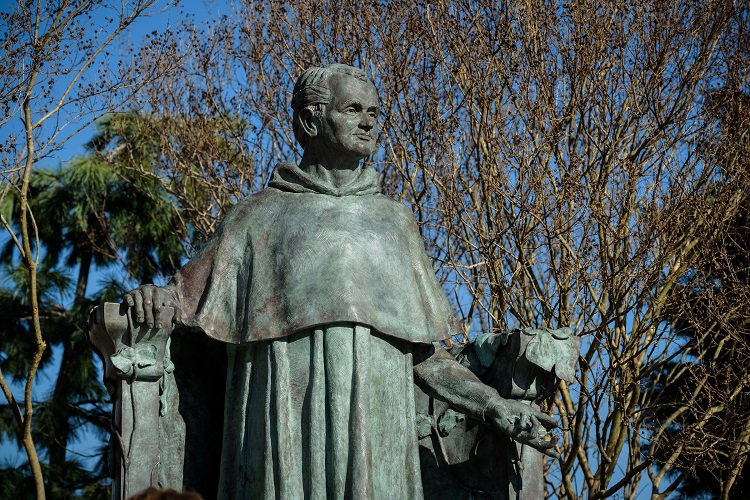Commemorating the 90th Anniversary of the Mendel Medal (1928-2018)

By Rev. Kail C. Ellis, OSA, PhD
This November, Villanova will celebrate the 90th anniversary of the founding of the Mendel Medal. Throughout its 90-year history, it is humbling to reflect that the Mendel Medal has brought some of the world’s most prominent scientists to Villanova’s campus. Honoring the achievements of these extraordinary individuals, including six Nobel Laureates has enabled Villanova’s faculty, students, staff, and guests to engage the most salient scientific topics confronting contemporary society and culture.
Like all significant events, the establishment of the Mendel Medal should be placed in the context of its time: the 1920s, when Darwin’s theory of evolution was contested as undermining traditional religious values and biblical belief, culminating in the so-called Scopes Monkey Trial, formally known as The State of Tennessee v. John Thomas Scopes. The Tennessee legislature passed a law that made it a misdemeanor punishable by fine to “teach any theory that denies the story of the Divine Creation of man as taught in the Bible, and to teach instead that man has descended from a lower order of animals.”
This is the atmosphere in which Father Joseph Dougherty (PhD biology), the head of the Villanova College science division, advocated that the Board of Trustees establish the Mendel Medal. Father Dougherty’s career was highly influenced by the seminal Augustinian geneticist Gregor Mendel. An authority on the Mendelian laws of heredity, Father Dougherty lectured widely on Mendelian theories and worked tirelessly to build the College’s pre-medical program.
The significance of the Mendel Medal is that it affirms there is no contradiction between science and religion. At the time that the award was established, scientists were roughly half (51%) as likely as the general public to believe in God or a higher power. In contrast, 95% of Americans believe in some form of deity or higher power. In establishing the award, the Board and Father Dougherty were not trying to assert that one was superior to the other or to challenge non-belief. Rather, science and religion were perceived as two separate but harmonious entities. The Mendel Medal is a symbol of Villanova’s choice to celebrate the compatibility of science and religion by honoring “outstanding scientists who have given practical demonstration of the fact that between true science and true religion there is no real conflict.”
Not surprisingly, the hotbed issues of science and religion of Father Dougherty’s time continue to thrive today. When President Obama nominated the renowned geneticist Francis Collins to be the new director of the National Institutes of Health (NIH), a number of scientists and pundits publicly questioned whether his devout religious faith should disqualify him from the position. Nevertheless, the U.S. Senate unanimously confirmed Dr. Collins in August 2009. Villanova honored Dr. Collins with the Mendel Medal in 1998 for his work as director of the National Center for Human Genome Research.
Today, the issue of teaching evolution continues to create controversy. The 2009 Mendel Medal recipient, Dr. Kenneth Miller, was the plaintiff's lead expert witness in the 2005 landmark Kitzmiller v. Dover Area School District case that challenged the school board's mandate to incorporate intelligent design—a religious argument that rejects the theory of natural selection and argues that the complexities of the universe suggests an intelligent cause in form of a supreme creator—into the curriculum. The mandate of the school district was, with Dr. Miller’s testimony, overturned.
Dr. Olufunmilayo Olopade, the 2017 Mendel Medal recipient, told Villanova students at her lecture how lucky they were to be at a university that celebrates the heritage of Gregor Mendel. Her words affirm the vision of Father Dougherty and the Villanova Board of Trustees in establishing the Mendel Medal. They also demonstrate that Mendel’s legacy extends beyond the classroom and the lab, and is integral to the Augustinian ethos of the university.
The Church has a long history of appreciation for the sciences, as well as a concern for the ethical and environmental responsibilities of the scientific community. The devastation that threatens the welfare of the earth and the environment has come to the fore as a major yet controversial concern. Pope Benedict XVI expressed fear for the continued existence of life on the earth. He wrote of the necessity to “Respect the interior laws of creation, of this Earth, to learn these laws and obey them if we want to survive. This obedience to the voice of the Earth is more important for our future happiness . . . than the desires of the moment. Our Earth is talking to us and we must listen to it and decipher its message if we want to survive.”
Pope Benedict’s words anticipated Pope Francis’ now famous encyclical Laudate Si’ in 2015, in which Francis issued an “urgent challenge to protect our common home … to bring the whole human family together to seek a sustainable and integral development, for we know that things can change.”
Mendel certainly falls within the tradition of concern for the earth. He is famously honored for his discovery of the laws of heredity and for helping to shape the world’s collective understanding of genes, crossbreeding, and heredity. Nevertheless, it is important to remember his achievements as a polymath. He published important works from his meteorological observations, while his study of bees also shaped his thinking on heredity. Mendel’s concerns for the environment are especially relevant today and were commemorated in the University’s second Mendel Symposium in 2017: “Care of Our Common Home: Pope Francis’s Encyclical Laudato Si’.”
Despite the science, both evolution and climate change continue to be controversial and although distinct, linked in the mutual embrace of skepticism. Villanova University is justly proud to celebrate its 90-year vision of the compatibility of science and religion that Father Dougherty and the Board of Trustees intended.
